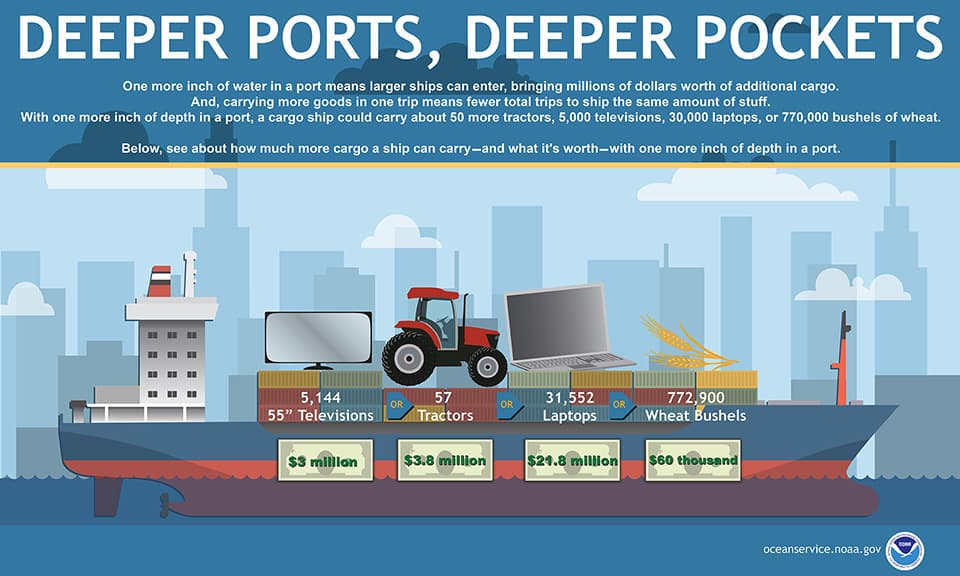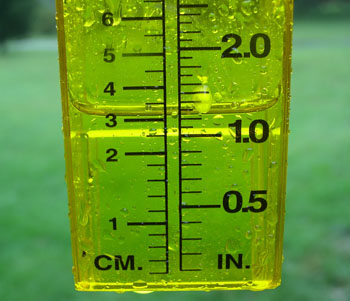An Inch of Water. What's it Worth?
Special Stories
1 May 2018 9:39 AM
From NOAA
Our nation’s ports are the lifelines of our economy. Our nation’s ports are the lifelines of our economy. In 2017, foreign trades through U.S. ports were valued at $1.6 trillion—$527 billion exports and $1.1 trillion imports were moved by vessels. When goods travel through ports, it means they are traveling via ship.
NOS is in the business of making sure that mariners—and the goods they are transporting—make it to their destinations safely and quickly. Just as airplane pilots need to know current weather and ground conditions, ship captains need to know exactly what's going on in the water and in the air. NOS monitoring systems supply mariners with the real-time data they need, providing information such as water levels, wind and current speeds and directions, and water temperature. But what does this have to do with that inch of water?
 [One more inch of water in a port means larger ships can enter, bringing millions of dollars worth of additional cargo. And, carrying more goods in one trip means fewer total trips to ship the same amount of stuff. That’s good for the safety of our waterways, it’s good for the environment, and it’s good for your wallet.]
A ship needs a certain amount of water in order to float and not touch bottom. This water depth is called the ship’s “draft.” The more cargo a ship carries, the more the ship will weigh, meaning it will sink more and require more draft. Even a slight decrease in the depth of a waterway will require a ship to reduce the amount of cargo it is carrying. On the flipside, more water means more cargo. This, in turn, translates into fewer trips needed to transport goods.
Accurate data provided by NOS are crucial to making decisions regarding ship draft and cargo loads. In the absence of this information, mariners would need to be much more conservative in their draft estimates, or risk additional maritime accidents.
[One more inch of water in a port means larger ships can enter, bringing millions of dollars worth of additional cargo. And, carrying more goods in one trip means fewer total trips to ship the same amount of stuff. That’s good for the safety of our waterways, it’s good for the environment, and it’s good for your wallet.]
A ship needs a certain amount of water in order to float and not touch bottom. This water depth is called the ship’s “draft.” The more cargo a ship carries, the more the ship will weigh, meaning it will sink more and require more draft. Even a slight decrease in the depth of a waterway will require a ship to reduce the amount of cargo it is carrying. On the flipside, more water means more cargo. This, in turn, translates into fewer trips needed to transport goods.
Accurate data provided by NOS are crucial to making decisions regarding ship draft and cargo loads. In the absence of this information, mariners would need to be much more conservative in their draft estimates, or risk additional maritime accidents.
 [Image from South Nation Conservation]
Consider that carrying more cargo on a single trip means fewer trips overall to transfer the same amount of materials. That’s good for the safety of our waterways, it’s good for the environment, and, because it saves money, it’s good for your wallet.
Edited for WeatherNation by Meteorologist Mace Michaels
[Image from South Nation Conservation]
Consider that carrying more cargo on a single trip means fewer trips overall to transfer the same amount of materials. That’s good for the safety of our waterways, it’s good for the environment, and, because it saves money, it’s good for your wallet.
Edited for WeatherNation by Meteorologist Mace Michaels
 [One more inch of water in a port means larger ships can enter, bringing millions of dollars worth of additional cargo. And, carrying more goods in one trip means fewer total trips to ship the same amount of stuff. That’s good for the safety of our waterways, it’s good for the environment, and it’s good for your wallet.]
A ship needs a certain amount of water in order to float and not touch bottom. This water depth is called the ship’s “draft.” The more cargo a ship carries, the more the ship will weigh, meaning it will sink more and require more draft. Even a slight decrease in the depth of a waterway will require a ship to reduce the amount of cargo it is carrying. On the flipside, more water means more cargo. This, in turn, translates into fewer trips needed to transport goods.
Accurate data provided by NOS are crucial to making decisions regarding ship draft and cargo loads. In the absence of this information, mariners would need to be much more conservative in their draft estimates, or risk additional maritime accidents.
[One more inch of water in a port means larger ships can enter, bringing millions of dollars worth of additional cargo. And, carrying more goods in one trip means fewer total trips to ship the same amount of stuff. That’s good for the safety of our waterways, it’s good for the environment, and it’s good for your wallet.]
A ship needs a certain amount of water in order to float and not touch bottom. This water depth is called the ship’s “draft.” The more cargo a ship carries, the more the ship will weigh, meaning it will sink more and require more draft. Even a slight decrease in the depth of a waterway will require a ship to reduce the amount of cargo it is carrying. On the flipside, more water means more cargo. This, in turn, translates into fewer trips needed to transport goods.
Accurate data provided by NOS are crucial to making decisions regarding ship draft and cargo loads. In the absence of this information, mariners would need to be much more conservative in their draft estimates, or risk additional maritime accidents.
 [Image from South Nation Conservation]
Consider that carrying more cargo on a single trip means fewer trips overall to transfer the same amount of materials. That’s good for the safety of our waterways, it’s good for the environment, and, because it saves money, it’s good for your wallet.
Edited for WeatherNation by Meteorologist Mace Michaels
[Image from South Nation Conservation]
Consider that carrying more cargo on a single trip means fewer trips overall to transfer the same amount of materials. That’s good for the safety of our waterways, it’s good for the environment, and, because it saves money, it’s good for your wallet.
Edited for WeatherNation by Meteorologist Mace MichaelsAll Weather News
More